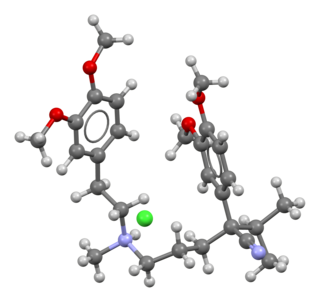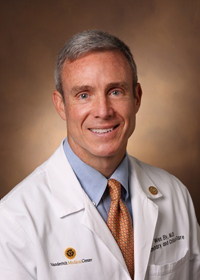Related Research Articles

Pharmacology is a branch of medicine, biology and pharmaceutical sciences concerned with drug or medication action, where a drug may be defined as any artificial, natural, or endogenous molecule which exerts a biochemical or physiological effect on the cell, tissue, organ, or organism. More specifically, it is the study of the interactions that occur between a living organism and chemicals that affect normal or abnormal biochemical function. If substances have medicinal properties, they are considered pharmaceuticals.

Medical cannabis, or medical marijuana (MMJ), is cannabis and cannabinoids that are prescribed by physicians for their patients. The use of cannabis as medicine has not been rigorously tested due to production and governmental restrictions, resulting in limited clinical research to define the safety and efficacy of using cannabis to treat diseases.

Escitalopram, sold under the brand names Lexapro and Cipralex, among others, is an antidepressant of the selective serotonin reuptake inhibitor (SSRI) class. Escitalopram is mainly used to treat major depressive disorder and generalized anxiety disorder. It is taken by mouth, available commercially as an oxalate salt exclusively.

Bupropion, sold under the brand names Wellbutrin and Zyban among others, is an atypical antidepressant primarily used to treat major depressive disorder and to support smoking cessation. Bupropion is an effective antidepressant on its own, but it is also popular as an add-on medication in the cases of incomplete response to the first-line selective serotonin reuptake inhibitor (SSRI) antidepressant. Bupropion has several features that distinguish it from other antidepressants: it does not usually cause sexual dysfunction; it is not associated with weight gain and sleepiness, and it is more effective than SSRIs at improving symptoms of hypersomnia and fatigue. Bupropion does, however, carry a much higher risk of seizure than many other antidepressants and extreme caution must be taken in patients with a history of seizure disorder.

Furosemide is a loop diuretic medication used to treat fluid build-up due to heart failure, liver scarring, or kidney disease. It may also be used for the treatment of high blood pressure. It can be taken by injection into a vein or by mouth. When taken by mouth, it typically begins working within an hour, while intravenously, it typically begins working within five minutes.

Verapamil, sold under various trade names, is a calcium channel blocker medication used for the treatment of high blood pressure, angina, and supraventricular tachycardia. It may also be used for the prevention of migraines and cluster headaches. It is given by mouth or by injection into a vein.

Atorvastatin, sold under the brand name Lipitor among others, is a statin medication used to prevent cardiovascular disease in those at high risk and to treat abnormal lipid levels. For the prevention of cardiovascular disease, statins are a first-line treatment. It is taken by mouth.
Lester Grinspoon was an American psychiatrist and long-standing associate professor of psychiatry at Harvard Medical School best known for his groundbreaking works on the science and social policy of cannabis, psychedelics and other drugs, and for his commitment to changing harmful drug policies. He concurrently served as a senior psychiatrist at the Massachusetts Mental Health Center in Boston, Massachusetts for 40 years. Grinspoon was a fellow of the American Association for the Advancement of Science and the American Psychiatric Association. He was founding editor of The American Psychiatric Association Annual Review and Harvard Mental Health Letter. Grinspoon was editor of Harvard Mental Health Letter for fifteen years.

Goodman & Gilman's The Pharmacological Basis of Therapeutics, commonly referred to as the Blue Bible or Goodman & Gilman, is a textbook of pharmacology originally authored by Louis S. Goodman and Alfred Gilman. First published in 1941, the book is in its thirteenth edition, and has the reputation of being the "bible of pharmacology". The readership of this book include physicians of all therapeutic and surgical specialties, clinical pharmacologists, clinical research professionals and pharmacists.

Virgil Craig Jordan,, is a scientist with American and British citizenship specializing in drugs for breast cancer treatment and prevention. Currently, he is Professor of Breast Medical Oncology, and Professor of Molecular and Cellular Oncology at the University of Texas MD Anderson Cancer Center, Houston, Texas. Previously, he was Scientific Director and Vice Chairman of Oncology at the Lombardi Comprehensive Cancer Center of Georgetown University. Jordan was the first to discover the breast cancer prevention properties of tamoxifen and the scientific principles for adjuvant therapy with antihormones. More recently his work has branched out into the prevention of multiple diseases in women with the discovery of the drug group, selective estrogen receptor modulator (SERMs). Currently, he plans to develop a new Hormone Replacement Therapy (HRT) for post-menopausal women that prevents breast cancer and does not increase the risk of breast cancer.

Peter Christian Gøtzsche is a Danish physician, medical researcher, and former leader of the Nordic Cochrane Center at Rigshospitalet in Copenhagen, Denmark. He is a co-founder of the Cochrane Collaboration and has written numerous reviews for the organization. His membership in Cochrane was terminated by its Governing Board of Trustees on 25 September 2018.

The European Association for Clinical Pharmacology and Therapeutics (EACPT) is a learned society in the field of clinical pharmacology. It is the leading society in Europe serving the European and global Clinical Pharmacology and Therapeutics community. It has its origins in a working party in the early 1980s under the auspices of the World Health Organization (WHO-Europe). Subsequently, a committee was created in 1993 chaired by Folke Sjöqvist with the remit to prepare the first congress of EACPT, held in Paris in 1995. At that congress the founding EACPT Council elected an Executive Committee with Sjöqvist as chairman, Michael Orme as Honorary Secretary, Jochen Kuhlmann (Germany) as Treasurer, and Giampaolo Velo (Italy) as Vice-Chairman, with 26 European countries as members through their home country clinical pharmacology society or section. The EACPT now includes all national organisations for clinical pharmacology in Europe and provides educational and scientific support for the more than 4000 individual professionals interested in Clinical Pharmacology and Therapeutics throughout the European region, with its congresses attended by a global audience.

Overtreated - Why too much Medicine is Making us Sicker and Poorer is a 2007 book by Shannon Brownlee about unnecessary health care.

Peter R. Kowey is an American cardiologist and medical researcher. He is Professor of Medicine and Clinical Pharmacology at Jefferson Medical College of Thomas Jefferson University and holds the William Wikoff Smith Chair in Cardiovascular Research at Lankenau Institute for Medical Research.

Eugene Wesley Ely Jr. is an American physician, writer, and professor of medicine who serves as the Grant W. Liddle Endowed Chair at Vanderbilt University School of Medicine. He is conducting research as a geriatric intensivist in the Division of Pulmonary and Critical Care Medicine and the Center for Health Services Research at Vanderbilt University Medical Center. He is also the associate director of research at the Tennessee Valley Geriatric Research Education and Clinical Center (GRECC), part of the U.S. Department of Veterans Affairs.
Medical cannabis research includes any medical research on using cannabis. Different countries conduct and respond to medical cannabis research in different ways.
Scott A. Waldman is an MD and biomedical scientist at Sidney Kimmel Medical College of Thomas Jefferson University, where he is the Samuel M.V. Hamilton Professor of Medicine, and also tenured professor and chair of the Department of Pharmacology & Experimental Therapeutics. He is author of a pharmacology textbook, and former chief editor of Clinical Pharmacology & Therapeutics. He is known for his work in atrial natriuretic factor intracellular signaling through guanylate cyclase (GC), and the relation of Guanylyl cyclase C (GC-C) to the pathogenesis of colorectal cancer. Also for his hypotheses concerning the roles of intestinal paracrine hormones in satiety, obesity and cancer risk. Waldman also holds a concurrent position as adjunct professor at the University of Delaware, School of Health Sciences.
Ronald Okun is an American physician and pharmacologist. He testified before the United States Congress three times on behalf of tobacco industry in the 1960s and 1970s, attempting to discredit the fact that smoking causes illness. He was also the co-editor of the Annual Review of Pharmacology and Toxicology from 1977–1989. For at least twenty years, he was the director of clinical pharmacology at Cedars-Sinai Medical Center.

Steven Grinspoon (M.D.) is a Professor of Medicine at Harvard Medical School, Chief of the Massachusetts General Hospital (MGH) Metabolism Unit, and Director of the Nutrition Obesity Research Center at Harvard. In addition, he is the MGH Endowed Chair in Neuroendocrinology and Metabolism. His work investigates the neuroendocrine regulation of body composition, and physiologic consequences of fat distribution on cardiovascular disease and inflammation. He has investigated the effects of reduced growth hormone on metabolic dysregulation in obesity and was the first to propose the use of a Growth Hormone-releasing Hormone (GHRH) analogue to increase endogenous GH secretion on lipodystrophy and generalized obesity, which led to the FDA approval of Tesamorelin for excess visceral fat accumulation in HIV-infected patients. This work has now been extended to show robust effects on Non-alcoholic fatty liver disease (NAFLD). More recently, his research focuses on the inflammatory mechanisms by which ectopic fat and other metabolic perturbations contribute to HIV-Cardiovascular disease (CVD), and in this regard, he led the AHA State of the Science Conference on CVD in HIV. Additionally, he is leading the large multicenter REPRIEVE study, the first study of a primary prevention strategy for CVD in HIV. He has also investigated increased Renin-Angiotensin-Aldosterone System (RAAS) activation and immune activation in relationship to visceral fat accumulation, and the mechanisms of subcutaneous adipose dysfunction involving DICER. Dr. Grinspoon has served on the Harvard faculty since 1995 and has been selected to the American Society for Clinical Investigation and the Association of American Physicians for his scientific contributions. He received the American Federation of Medical Research Investigator of the Year Award in 2005 and the Edward H. Ahrens Jr. Award for Patient Oriented Research in 2014 as well as the Endocrine Society Laureate Award for Translational Research in 2016. He has published over 330 articles and mentored over 40 trainees in his career. He was elected as a Member of the American Clinical and Climatological Association for his achievements in 2017. His work demonstrating effects of Tesamorelin to reduce hepatic fat and fibrosis progression in NAFLD, published in Lancet HIV, was a finalist for the Clinical Research Forum’s top 10 Clinical Research Achievement Awards in 2020. In 2015, he became the Principal Investigator of the NIH funded Nutrition Obesity Research Center at Harvard.
References
- ↑ "Marihuana Reconsidered". Kirkus Reviews. Retrieved November 22, 2019.
- ↑ Hollister, Leo E. (July 12, 1971). "Marihuana Reconsidered". JAMA. 217 (2): 216. doi:10.1001/jama.1971.03190020074031.
- ↑ Walter, Modell (September 1971). "Book review: Marihuana Reconsidered". Clinical Pharmacology & Therapeutics. 12 (5): 880–881. doi:10.1002/cpt1971125880.
- ↑ Pillard, Richard C. (August 12, 1971). "Book review: Marihuana Reconsidered". The New England Journal of Medicine. 285 (7): 416–417. doi:10.1056/NEJM197108122850737.
- ↑ Goddard, James L. (June 27, 1971). "The best dope on pot so far". The New York Times. Retrieved November 22, 2019.